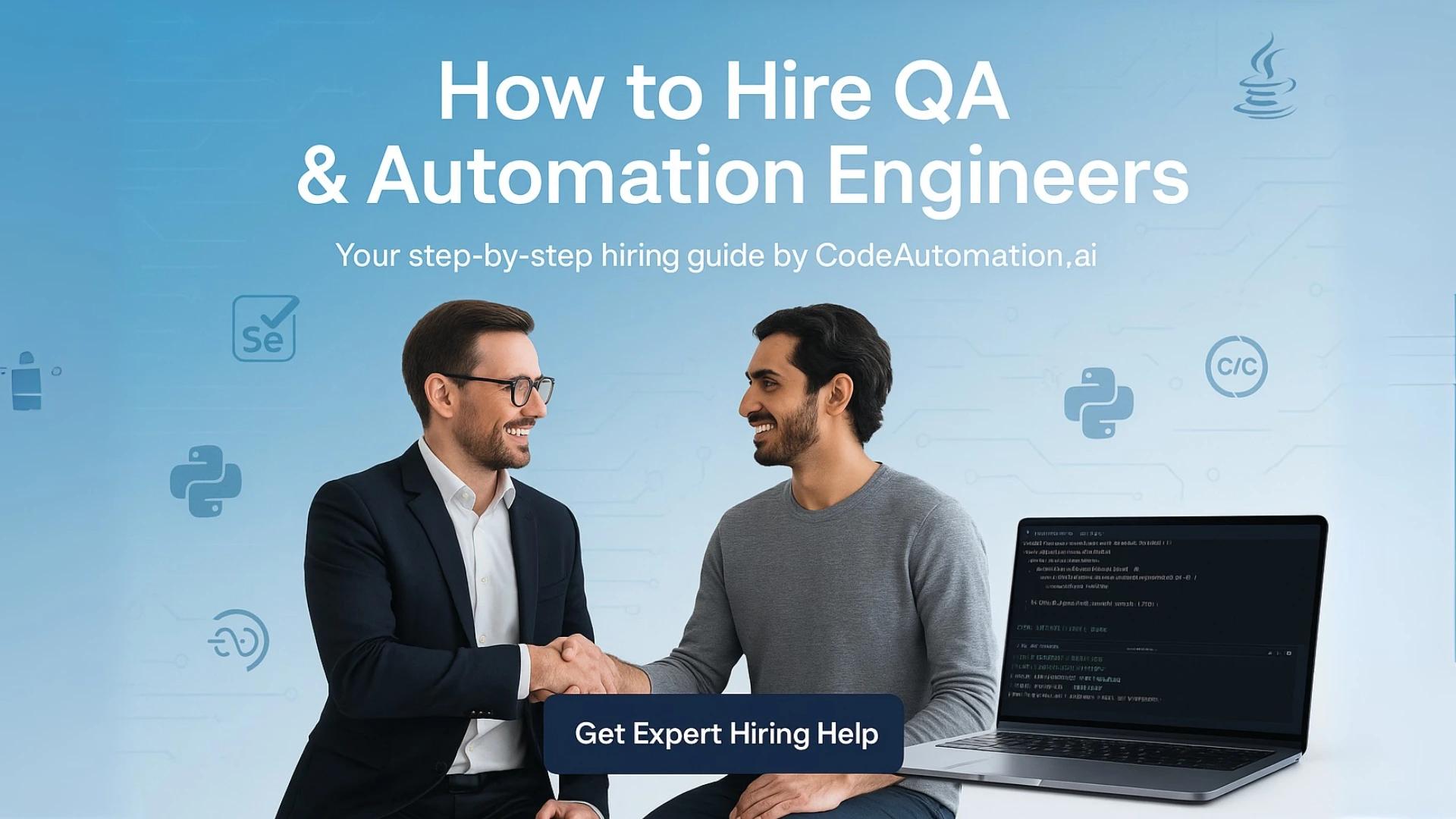
How to Hire QA and Automation Engineers: A Complete Guide




Introduction By Adnan Ghaffar Published 03/ 09/ 2025




In today's fast-paced, software-driven world, hiring the right QA and Automation Engineer can be a game-changer for your company. Quality Assurance (QA) automation isn't just about catching bugs, it's about ensuring your products launch smoothly, deliver exceptional user experiences, and protect your business's reputation. But let's face it: the hiring process can feel overwhelming. Do you prioritize expertise in specific technical frameworks? What interview questions will reveal the best candidates? And how do you budget for it all without breaking the bank? This guide is here to break it down for you, step by step. We'll dive into why QA automation is crucial, how to navigate the hiring process, what makes a standout job description, the key skills to seek out, effective interview strategies, and realistic cost expectations. Whether you're a startup assembling your initial QA team or a large enterprise expanding your automation capabilities, you'll walk away with the tools and insights to hire QA and automation engineers with confidence and precision.
2. Why Hiring a QA Automation Engineer Matters
Think about it: software quality isn't optional anymore, it's what sets successful businesses apart. One overlooked bug slipping into production could lead to massive financial losses, damaged customer loyalty, and stalled momentum.
That's where the role of a QA automation engineer shines. These professionals create robust frameworks and scripts that run repetitive tests automatically, ensuring consistency and efficiency. The result? Faster release cycles without sacrificing reliability.
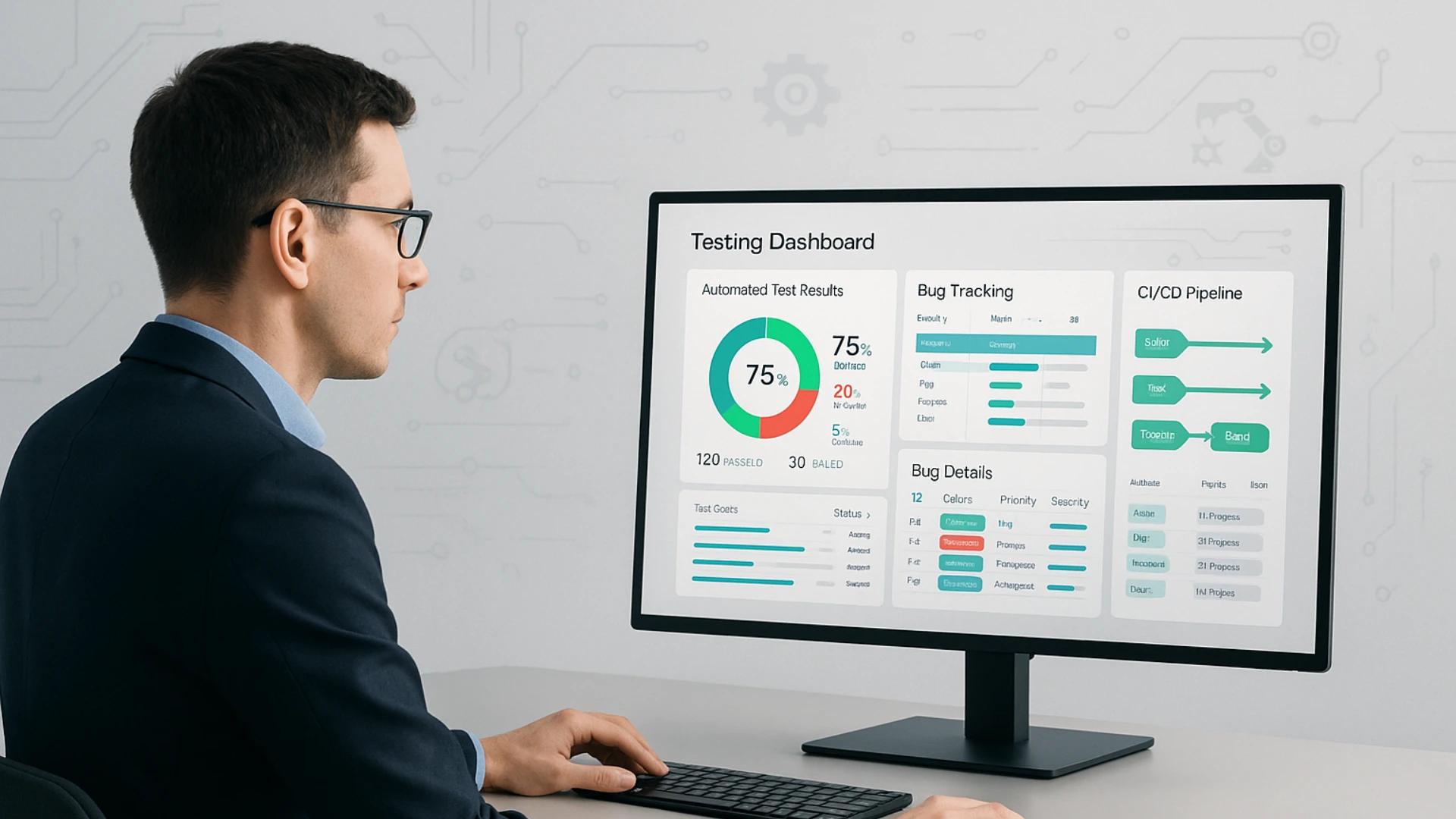
It's helpful to distinguish between manual QA and QA automation engineers. Manual testers handle tests hands-on, which is fine for smaller projects but quickly becomes inefficient as things scale. Automation engineers, on the other hand, code scripts that can handle hundreds of tests in a fraction of the time, boosting accuracy and freeing up resources for more creative work.
So, when should your business bring one on board? If you're rolling out frequent updates, adding complex features, or operating in regulated fields like fintech or healthcare, a QA automation expert is essential. They'll help you uphold quality standards, meet compliance requirements, and keep your development pipeline humming.
3. How to Hire a QA Automation Engineer
Hiring a QA automation engineer goes beyond slapping a job posting online, it's about a thoughtful, structured strategy to find someone who truly fits your needs.
Step-by-Step Guide
- Define your testing goals: Start by clarifying what you need—whether it's broader test coverage, quicker turnaround times, or strict compliance adherence.
- Choose tools and frameworks: Align with your existing tech stack. Popular options include Selenium for web testing, Cypress for modern JavaScript apps, or Playwright for cross-browser automation.
- Write a clear job description: This is your magnet for top talent—we'll dive deeper into this later.
- Shortlist candidates: Review resumes for relevant experience, portfolios of past automation projects, and evidence of problem-solving.
- Conduct a structured interview process: Mix technical assessments with behavioral discussions to get a well-rounded view.
- Evaluate coding tests and cultural fit: Hands-on challenges reveal real skills, while conversations ensure they'll mesh with your team.
- Make an offer: Seal the deal with competitive pay and perks that reflect their value.
Best Way to Hire for Startups
If you're running a startup with a lean operation, versatility is key. Seek engineers who can juggle manual testing alongside automation duties. They should be scrappy enough to build frameworks from the ground up and adaptable to evolving priorities. Platforms like LinkedIn or Upwork can help you find these all-rounders without a huge recruitment budget.
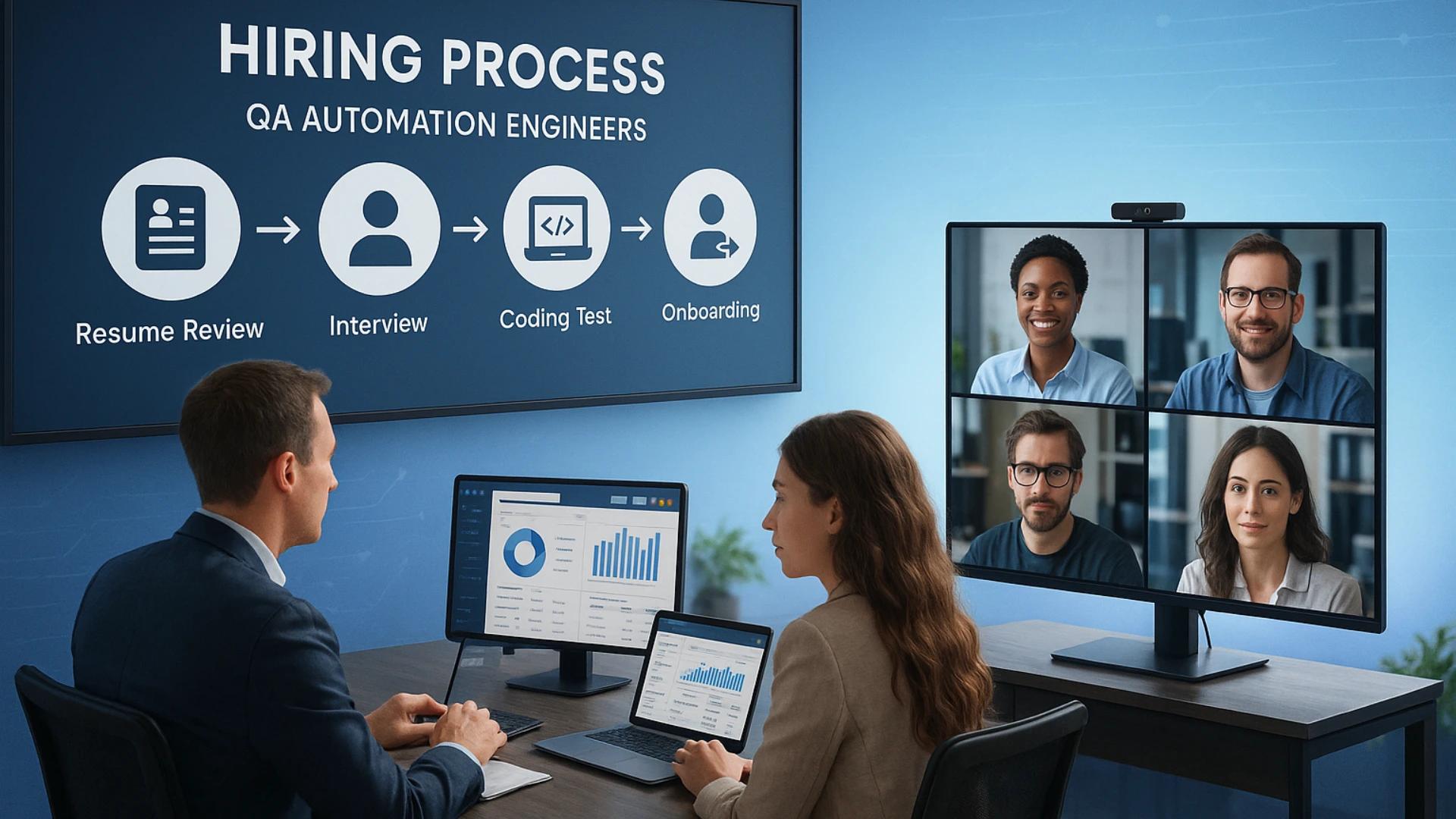
Hiring with Selenium Expertise
For teams already invested in Selenium, target candidates with proven hands-on experience. Look for those who've integrated it seamlessly into CI/CD pipelines, handling everything from setup to maintenance. This ensures minimal disruption and maximum efficiency in your workflows.
Hiring Remote Engineers Overseas
Tapping into global talent pools can be a smart move for cost savings, with strong candidates in Eastern Europe, South Asia, and Latin America. Just prioritize excellent communication skills to bridge any language gaps, and plan around time zone differences to keep collaboration smooth. Tools like Zoom and Slack can make remote setups feel seamless.
Mistakes to Avoid
Don't fall into common traps like:
- Focusing only on tool-specific knowledge while ignoring broader problem-solving abilities.
- Undervaluing soft skills such as collaboration and adaptability, which are crucial for long-term success.
Skipping cultural fit assessments, which can result in high turnover and wasted resources.
4. Writing the Perfect Job Description
Your job description is the first impression candidates get of your company—make it count. A clear, detailed one attracts qualified applicants and weeds out the mismatches early.
Why a Clear Job Description Matters
Vague postings lead to a flood of irrelevant applications and frustrated candidates. Instead, spell out expectations, tools, and responsibilities so everyone knows exactly what's involved from the start.
Free Job Description Template
Feel free to customize this ready-to-use template:
Job Title: QA Automation Engineer
Responsibilities:
- Design, develop, and maintain automated test frameworks to ensure high-quality software delivery.
- Collaborate closely with developers and product managers to integrate quality checks throughout the development lifecycle.
- Execute automated test scripts, analyze results, and report bugs with detailed documentation.
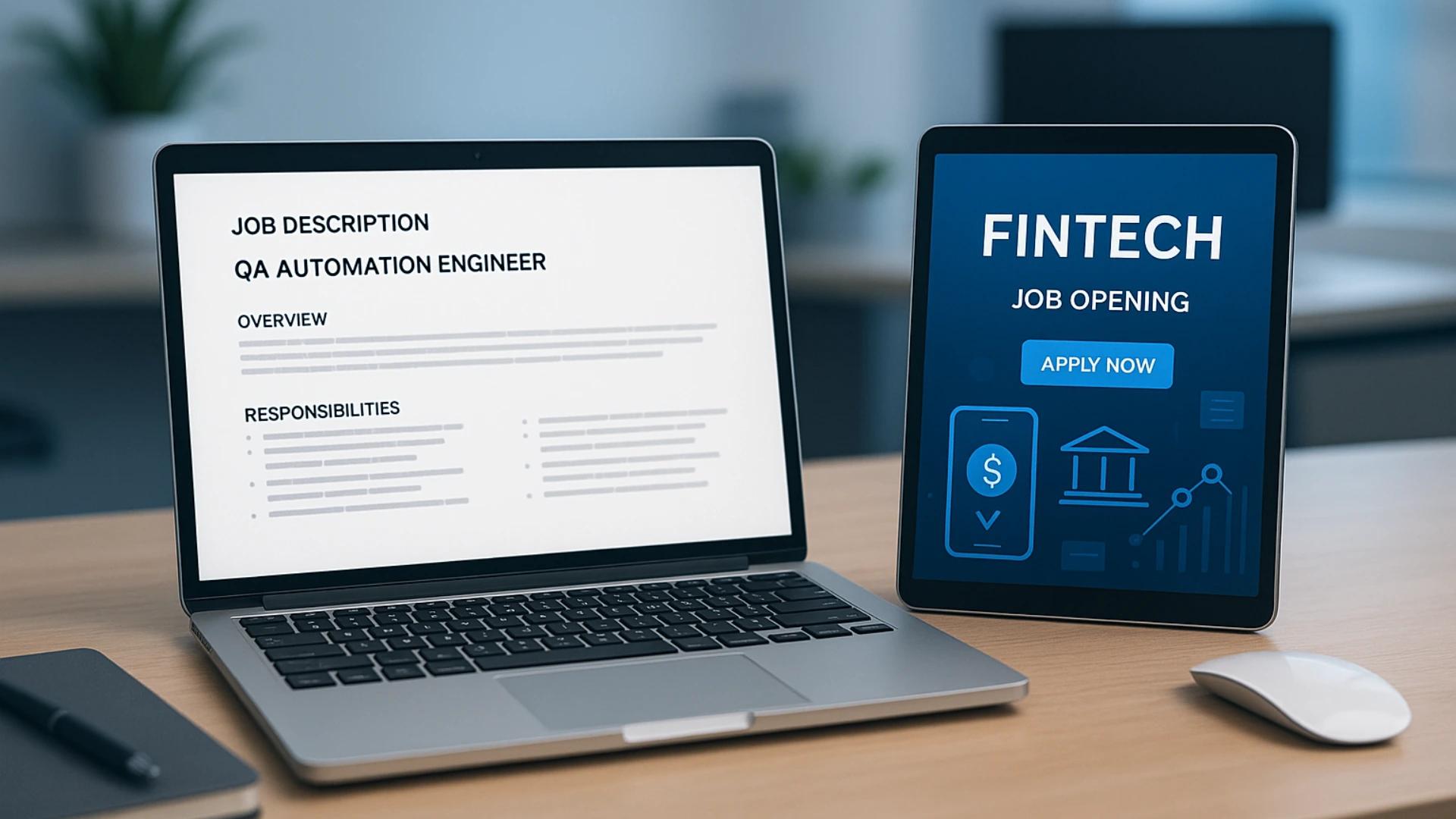
Requirements:
- Hands-on experience with automation tools like Selenium, Cypress, or Playwright.
- Proficiency in programming languages such as Java, Python, or JavaScript.
- Familiarity with CI/CD pipelines (e.g., Jenkins, GitHub Actions).
- Strong problem-solving skills and excellent communication abilities.
Preferred Qualifications:
- Experience in agile environments.
- Knowledge of performance and security testing.
What We Offer:
- Competitive salary and benefits.
- Opportunities for professional growth in a dynamic team.
Industry-Specific Templates
Tailor it further for your sector:
- Fintech companies: Highlight expertise in regulatory compliance testing, like PCI DSS or fraud detection scenarios.
- Healthcare software: Stress HIPAA compliance, data security validation, and testing for patient safety features.
5. Essential Skills to Look for in a QA Automation Engineer
The ideal candidate blends deep technical know-how with interpersonal savvy to thrive in a team setting.
Key Technical Skills
- Automation frameworks: Mastery of tools like Selenium, Cypress, TestNG, or JUnit for building scalable tests.
- Continuous Integration tools: Experience with Jenkins, GitHub Actions, or CircleCI to automate workflows.
- API testing: Proficiency in Postman or REST Assured for backend validation.
- Cloud-based testing platforms: Familiarity with BrowserStack or Sauce Labs for cross-device testing.
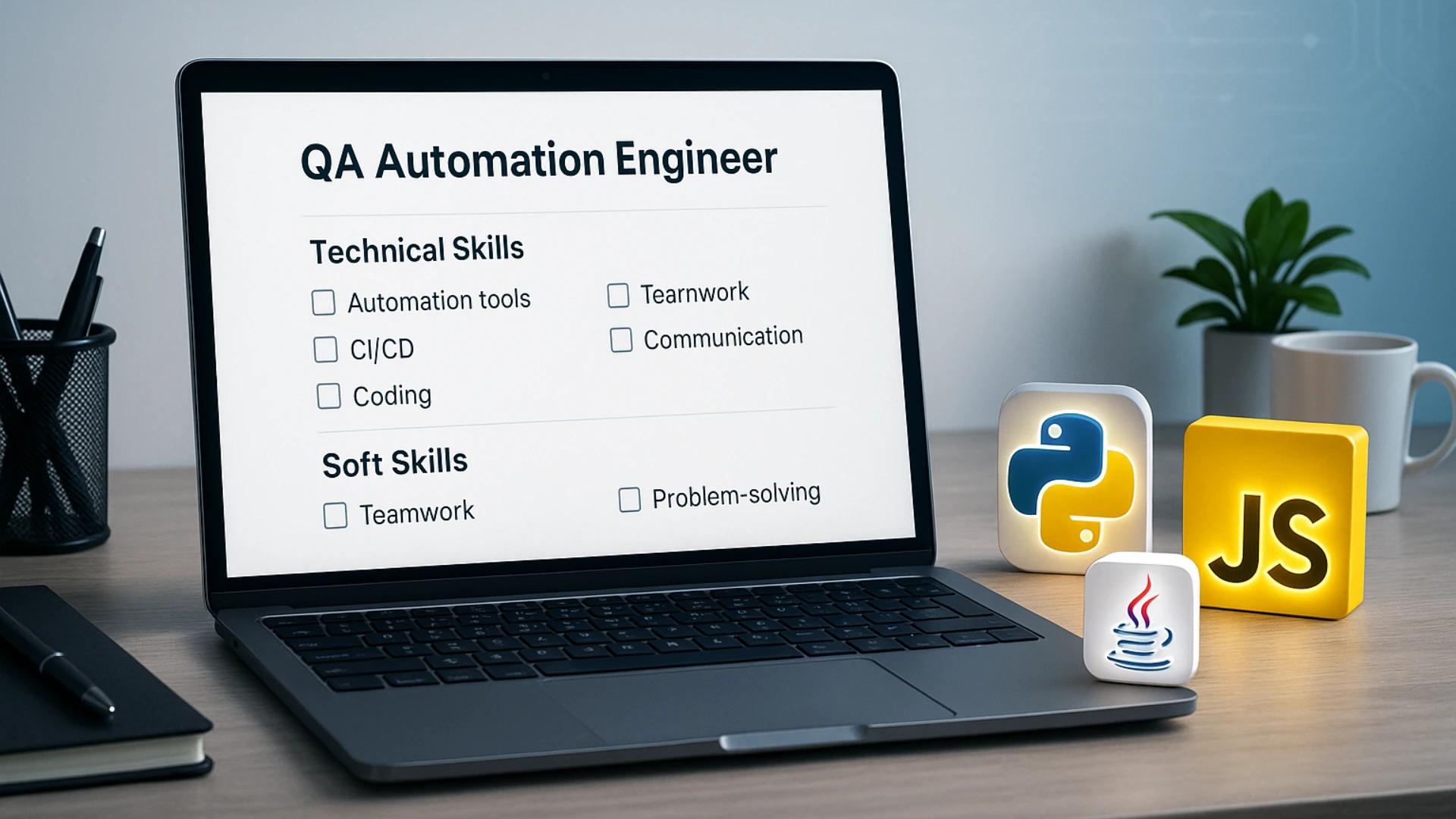
Programming Languages
QA automation engineers often excel in Java (great for enterprise-level testing), Python (ideal for quick scripting and data handling), or JavaScript (perfect for web-focused automation). Match their strengths to your stack for the best fit.
Soft Skills
- Analytical thinking: Spotting edge cases and potential failure points before they become issues.
- Strong communication: Clearly articulating defects and collaborating on fixes.
- Collaboration: Working hand-in-hand with developers, DevOps teams, and product managers to foster a quality-first culture.
6. Interviewing QA Automation Engineer Candidates
A solid interview process uncovers not just skills but also how a candidate thinks and interacts.
Structuring the Interview
- Initial screening: Gauge basic experience and communication via a quick call.
- Technical test: Hands-on coding or framework setup to test real-world abilities.
- Behavioral interview: Explore past experiences to assess teamwork and resilience.
- Final evaluation: Discuss case studies or portfolios for deeper insights.

Sample Interview Questions
Technical Questions:
- How would you design an automation framework from scratch for a web application?
- Explain how Selenium integrates with CI/CD pipelines—walk us through a real example.
- Demonstrate writing a script to automate login functionality using Python or Java.
Behavioral Questions:
- Describe a time when you caught a critical bug before release—what was your process?
- How do you handle conflicts with developers over reported issues?
- Share an example of adapting to a new tool or framework under tight deadlines.
For more depth, compile a list of the top 20 questions, including scenario-based challenges that mirror your product's challenges, like handling flaky tests or scaling automation for mobile apps.
7. Cost to Hire a QA Automation Engineer
Budgeting accurately is key—costs fluctuate based on location, experience, and market demands.
Average Salaries
- USA: $90,000 – $120,000 per year for mid-to-senior roles.
- India: $15,000 – $25,000 per year, offering great value for skilled talent.
- Eastern Europe: $40,000 – $60,000 per year, balancing expertise and affordability.
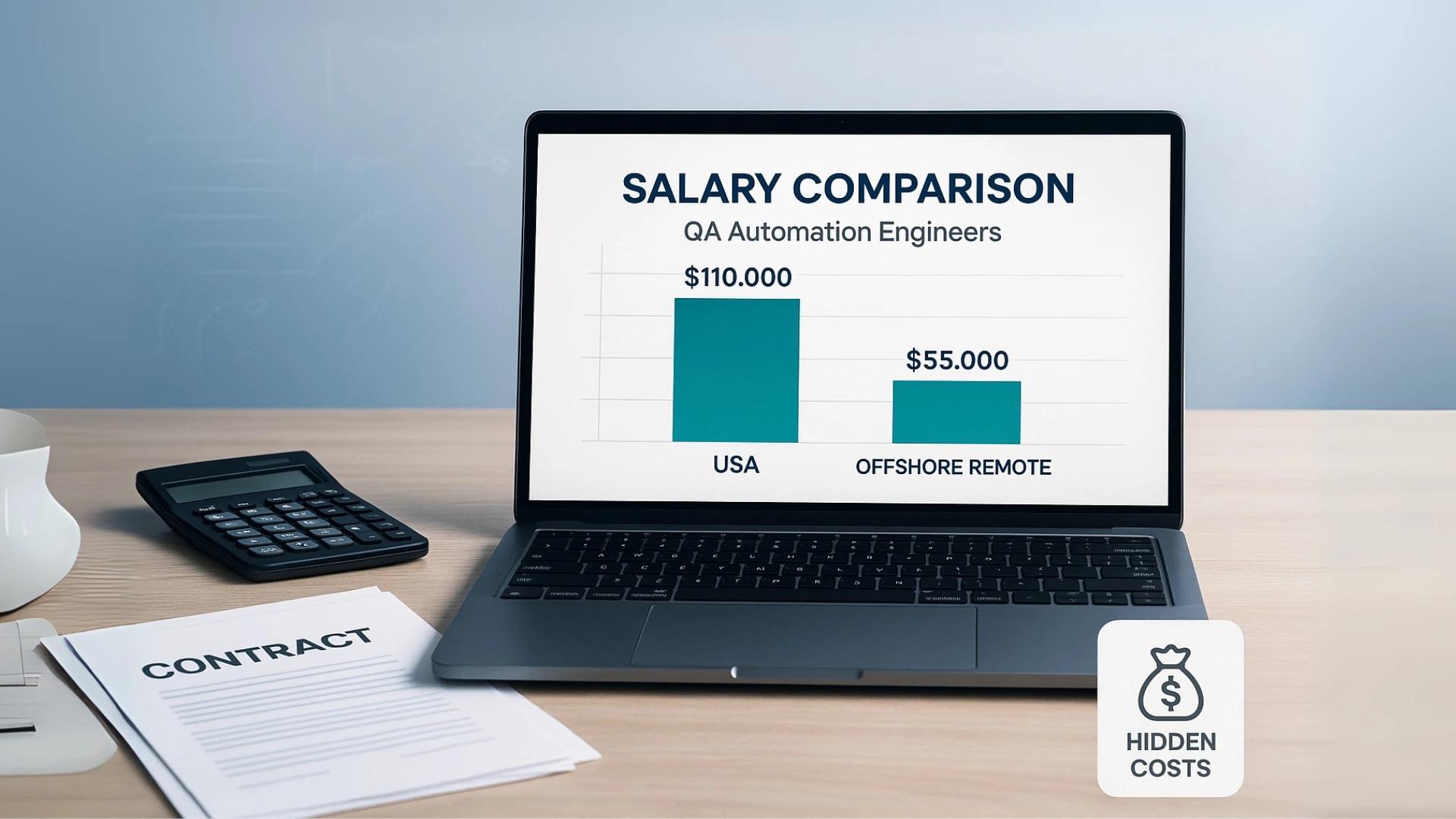
Factors Affecting Salary
- Experience: Juniors start lower, while seniors with 5+ years can demand premiums.
- Industry: Fintech and healthcare often pay more due to specialized compliance needs.
- Location: US-based onsite roles are pricier than remote offshore options.
Hidden Costs
Beyond salary, factor in:
- Onboarding and training programs to get them up to speed.
- Licenses for premium automation tools and platforms.
- Benefits, bonuses, and setup for remote work infrastructure.
Opting for offshore hires can slash salary costs but might require extra investment in tools for seamless communication and ongoing training.
Frequently Asked Questions (FAQs)
A: Automation Engineer designs, develops, and maintains automated testing frameworks to ensure software quality. They write scripts to automate repetitive test cases, integrate testing with CI/CD pipelines, and collaborate with developers to catch bugs early, ensuring faster and more reliable product releases.
A: While manual testers are great for small-scale or exploratory testing, QA Automation Engineers excel at scaling quality assurance for frequent releases or complex applications. They use tools like Selenium, Cypress, or Playwright to automate hundreds of tests, improving efficiency, accuracy, and speed compared to manual testing.
A: Look for expertise in automation frameworks (e.g., Selenium, TestNG), proficiency in programming languages like Java, Python, or JavaScript, and experience with CI/CD tools like Jenkins or GitHub Actions. Soft skills like analytical thinking, clear communication, and collaboration with cross-functional teams are equally critical.
A:Strong job description should clearly outline responsibilities, such as building automated test scripts and integrating with CI/CD pipelines, and specify required skills, like proficiency in Selenium or API testing with Postman. Include your tech stack and industry needs (e.g., HIPAA compliance for healthcare) to attract relevant candidates. Use our template in the blog for a head start!
A: Popular tools include Selenium for web testing, Cypress for modern JavaScript apps, Playwright for cross-browser testing, and Postman for API testing. Cloud platforms like BrowserStack or Sauce Labs are also valuable for multi-device testing. Choose tools that align with your project’s tech stack.
A: Costs vary by region and experience. In the USA, salaries range from $90,000 to $120,000 annually. In India, expect $15,000 to $25,000, and in Eastern Europe, $40,000 to $60,000. Additional costs include onboarding, tool licenses, and benefits. Offshore hiring can reduce salary expenses but may require investment in communication tools.
A: Both options work, depending on your needs. Local hires in the US offer seamless collaboration but come at a higher cost. Remote hires from regions like South Asia or Latin America can be cost-effective, provided they have strong communication skills and align with your time zone for smooth teamwork.
A: Avoid focusing only on tool-specific knowledge without assessing problem-solving skills. Don’t overlook soft skills like teamwork or cultural fit, as these impact long-term retention. Also, ensure your job description is clear to avoid mismatched candidates.
A: Ask technical questions like, “How would you design an automation framework from scratch?” or “Demonstrate a script to automate login functionality.” Behavioral questions, such as “Describe a time you caught a critical bug,” reveal their experience and teamwork. Check the blog for a full list of sample questions.
A: For startups, a QA Automation Engineer can set up scalable testing frameworks from scratch, ensuring quality as your product grows. Their ability to handle both manual and automated testing makes them versatile, saving time and resources while maintaining high standards for user experience.
Adnan Ghaffar is the visionary CEO of CodeAutomation.ai, a platform dedicated to transforming how businesses build software through cutting-edge automation. With over a decade of experience in software development, QA automation, and team leadership, Adnan has built a reputation for delivering scalable, intelligent, and high-performance solutions.
Under his leadership, CodeAutomation.ai has grown into a trusted name in AI-driven development, empowering startups and enterprises alike to streamline workflows, accelerate time-to-market, and maintain top-tier product quality. Adnan is passionate about innovation, process improvement, and building products that truly solve real-world problems.


